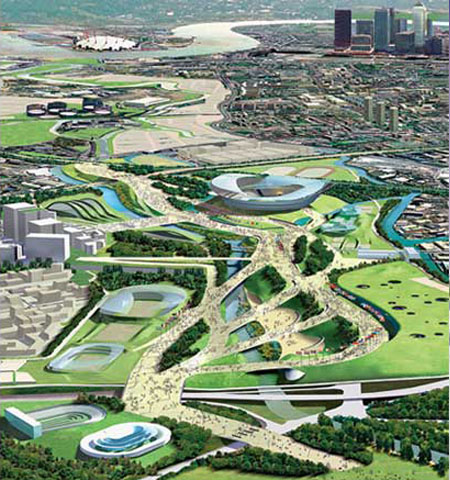
- Plan for London Olympics 2012 Village Photo: ecofriend.org
In 2012, London will be hosting the Summer Olympics, “the greenest games to date” according to the Olympic Delivery Authority chief executive, David Higgins.
London authorities are gearing up to win the gold in sustainability, with claims of cutting carbon emissions, lighting a carbon neutral Olympic Flame, using recycled materials and cleaning up the brownfield upon which athletes will compete. But that’s not the only legacy the city hopes to accomplish. London is also looking to implement a robust social agenda to accompany the physical regeneration projects. As the Strategic Regeneration Framework report hopefully proposes:
The true legacy of 2012 is that within 20 years the communities who host the 2012 Games will have the same social and economic chances as their neighbours across London.
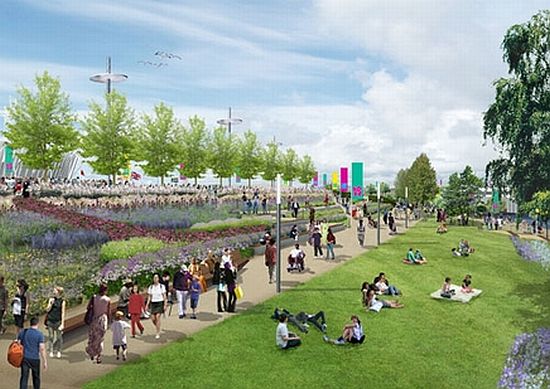
- London Olympics Photo: gadiss.com
As is the case with most Olympic games, the site that will host the events is situated in a low-income area. In this case, the Olympic turf sits on five different boroughs in London: Hackney, Greenwich, Newham, Tower Hamlets and Waltham Forest, which collectively make up the most deprived areas in England and Wales. The Strategic Regeneration Framework report provides the dismal statistics about the area, which has a greater unemployment rate than the rest of the city (64.2% of the population are employed in the host boroughs area compared with 70.4% in London), shorter life expectancy rates (An extra 15 people per 100,000 of the population die prematurely in the host boroughs than in London overall), more overcrowded residences (The percentage of households who live in overcrowded conditions is between 18% and 38% in the five host boroughs. The London average is under 7%), and lower educational attainment rates (17% of adults in the host boroughs have no qualifications, compared to 11.6% in London. This gap means 67,000 more people than the London average have no qualifications.)
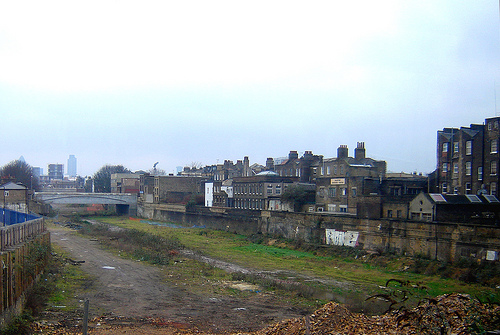
 East London, 2010 Photos: Flickr/Matt Bidulph, Flickr/Fin Fahey
East London, 2010 Photos: Flickr/Matt Bidulph, Flickr/Fin Fahey
The Olympic plan to help these communities? Some goals include: creating several hundred thousand jobs in the area, boosting residents’ qualification levels, reducing child poverty in the area, increasing local school scores, developing affordable housing, reducing the amount of “people with a chronic health condition”, increasing physical activity in adults and decreasing the number of burglaries in these areas. A Herculean plan to be accomplished in a mere 20 years, in areas that have been neglected for much longer.
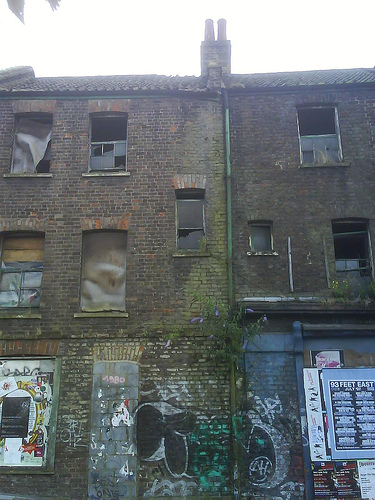
- East London Photo: Flickr/bixentro
While the outcomes of the Games in different cities vary, the Olympics are commonly seen as bringing a very positive economic boost to a host city, providing things such as improved infrastructure, jobs, affordable housing, tourism and increased investment thanks to the international prestige of holding the events. A lot of this can be true – especially in the short-term – with for example, a big boost to construction jobs in the period leading up to the events. But there is another side to the story.
Hosting the Olympics has always been seen as a political opportunity to redress social grievances by developing areas which have long been ignored in order to make them look more attractive (for business), the belief being that the wealth brought to the inner-city area will affect the community in a positive “trickle down” way. Most often however, the social spending that occurs during the Games translates into a good publicity stunt when the games are on and not into long-term solutions for issues of affordable housing, poverty or joblessness in a city.
Some of the most problematic effects of the Olympics on a city include colossal debt brought on by pre-game overspending. The 1976 Montreal Summer Olympics offer a case in point — it took the city 30 years to pay off their debt! The real legacy of hosting the games is often gentrification, dispossession and displacement of low-income communities, increased homelessness, unused and expensive-to-maintain sport facilities, and, of course, the missed opportunity to have used the money spent on the Games to redress social and economic inequalities much earlier on.
Cities that have ended up with much higher social costs than benefits include: the Salt Lake City Winter Olympics of 2002, with its attendant urban sprawl, aggravated inner city decay, and increased homelessness. The 1994 Atlanta Summer Olympics in some ways exposed and worsened racial and environmental injustices in the city. Even the recent Winter Olympics in Vancouver brought activists together to protest the doubling of the homeless population and the displacement of communities brought on by Olympic developments. (For more on this, read this great article from Real Change News.)
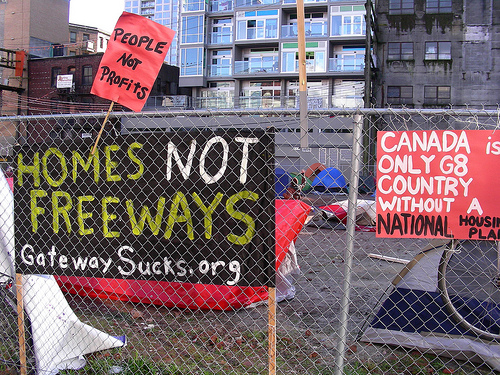
- Vancouver Tent City Photo: Flickr/livableregion
Megaphone Editor Sean Condon sums up the effect of the Games on the city of Vancouver:
Ultimately, the Olympics have brought very little benefit for homeless and low-income people…on something the provincial government has spent at least $6 billion of taxpayer money on — a two-week party that most people can’t even afford to attend. That money could have been used to virtually end homelessness in Vancouver and across British Columbia and would have left a much greater legacy than any sporting event could have.
So what of London then?
The Budget for the London Olympics is already way over its initial projections, with authorities dipping into the National Lottery kitty for an extra 2 billion pounds and with no promise of any kind of return.
So far, the only positive point of the London Olympics seems to be that they are the first living wage games – something the community organization London Citizens managed to secure – but according to the same organization, the city still has not committed to any real sustainable social housing plan for those families displaced by developments. The organization is working hard to create 2012 affordable houses within a community land trust by 2012.
How will London’s five areas actually be affected by the games? How realistic is the Olympic social agenda? And to what extent will long-term needs be addressed after the Games? Only time will tell.

Thank you for showing what is behind all the gloss and glimmer. Two photos did not show up on my computer – east London Fahey and Vancouver tent city. I am sorry to have missed them, but the information here is great. I will pass it on to others. mbw
From what I can gather through working on an employment project across Tower Hamlets, Hackney and Newham (3 of the 5 host boroughs) over the last few years very few local people seem to be benefitting even from the short term construction boom. To my mind, those construction jobs aren’t being done by local people to the extent thats been promised. And thats not meant in the Nationalistic ‘they’re all Polish immigrants’ sense.
Anecdotally it seems that contractors have bussed people in from wherever, to the extent of even giving them fake local addresses in order to skew the stats and not get too much heat from the Olympic Delivery Authority for not employing locals. Not that there would be too much heat, as the targets for employing locals appear only to be aspirational. Its unclear that Section 106 Agreements (see link for definition: http://www.idea.gov.uk/idk/core/page.do?pageId=71631) are in place or being enforced, so there’s basically no accountability, and therefore no real incentive to hire local.
For instance only in the last week it has emerged that there are only 150 apprentices working on the site, and only 1 from Hackney. Its a 500 acre site, and covered in construction workers.
Here’s a link or two:
Article about low numbers of apprentices: http://www.hackneycitizen.co.uk/2010/03/10/only-one-hackney-apprentice-on-olympics-site/
Link to an a report by the snappily titled All Party Urban Development Group about rengeneration projects creating local jobs: http://www.centreforcities.org/assets/files/APUDG-BuildingLocalJobsFINAL.pdf
Also, awareness raising network on issues relating to the London Olympics. Its billed as a network of individuals (which it may be) but there’s fairly strong themes, politically, running through the articles: http://www.gamesmonitor.org.uk/
What will help these people the most is abundant, affordable energy. Which is physically impossible to get from Windmills or Solar Panels. People will get back to work when less mandates, taxes, regulations and government are effected.
The other point this story completely misses is; Why do all these cities spend thousands and thousands then to try and host the games? Why? There must be a dozen places that the games can be held with a lot less cost. But it wouldn’t be fair I suppose to let those places make all the money. Perhaps every city in the world could get some of it, re-distribute the wealth.
If a city takes on the games then they take on the risk. If it can put them in financial ruin then they shouldn’t do it. Another point to be considered is; Who is making all the money? Networks? Advertisers? Athletes? Unions? Mafia’s? Political Figures? Social Costs do to corruption, greed, blind party / union backing and laziness. Poor story, no substance.
Thanks Greg. These are all really good questions that merit further reflection. I wrote the piece with the idea of presenting some of the main problems that games can pose to cities in order “debunk the myth”, so to speak, of the glorious effects of Olympic games on cities. These pieces, (if done well!), attempt to stimulate larger debate and I am glad that you participated in further opening up the conversation.
As for substance…well, we try.